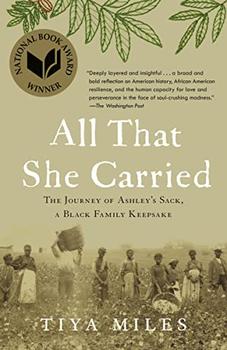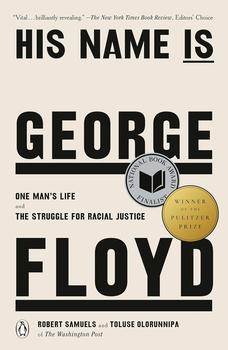Summary | Excerpt | Reviews | Beyond the book | Read-Alikes | Genres & Themes | Author Bio

The Journey of Ashley's Sack, a Black Family Keepsake
by Tiya MilesA renowned historian traces the life of a single object handed down through three generations of Black women to craft an extraordinary testament to people who are left out of the archives.
In 1850s South Carolina, an enslaved woman named Rose faced a crisis, the imminent sale of her daughter Ashley. Thinking quickly, she packed a cotton bag with a few precious items as a token of love and to try to ensure Ashley's survival. Soon after, the nine-year-old girl was separated from her mother and sold.
Decades later, Ashley's granddaughter Ruth embroidered this family history on the bag in spare yet haunting language—including Rose's wish that "It be filled with my Love always." Ruth's sewn words, the reason we remember Ashley's sack today, evoke a sweeping family story of loss and of love passed down through generations. Now, in this illuminating, deeply moving new book inspired by Rose's gift to Ashley, historian Tiya Miles carefully unearths these women's faint presence in archival records to follow the paths of their lives—and the lives of so many women like them—to write a singular and revelatory history of the experience of slavery, and the uncertain freedom afterward, in the United States.
The search to uncover this history is part of the story itself. For where the historical record falls short of capturing Rose's, Ashley's, and Ruth's full lives, Miles turns to objects and to art as equally important sources, assembling a chorus of women's and families' stories and critiquing the scant archives that for decades have overlooked so many. The contents of Ashley's sack— a tattered dress, handfuls of pecans, a braid of hair, "my Love always"—are eloquent evidence of the lives these women lived. As she follows Ashley's journey, Miles metaphorically unpacks the bag, deepening its emotional resonance and exploring the meanings and significance of everything it contained.
All That She Carried is a poignant story of resilience and of love passed down through generations of women against steep odds. It honors the creativity and fierce resourcefulness of people who preserved family ties even when official systems refused to do so, and it serves as a visionary illustration of how to reconstruct and recount their stories today.
The conversation that should be had after viewing Ashley's Sack is how black women slaves transferred love despite living through perversions, violence and endless work. How they desired freedom even as they didn't expect it. How they maneuvered, saved one another, sewed up wounds and mothered. It is these conversations Tiya Miles has triggered with this holy work. Rose was a tender mother, and that is at the heart of Miles' story, which is enormous not because of its 400+ pages but because of its artifacts, tales, tragedy and atrocities. Peeling back the racial onion is a sacred act of resistance. The heroism alone of how Rose loved a child when she herself was damaged is beautiful...continued
Full Review
(1105 words)
This review is available to non-members for a limited time. For full access,
become a member today.
(Reviewed by Valerie Morales).
 The three-tiered National Museum of African American History and Culture (NMAAHC) in Washington, D.C. embraces the rich history of slaves and their descendants. The museum opened in 2016, displaying thousands of artifacts illustrating the experience of the unfree, and the emancipated, including Ashley's Sack (which will be on display next at the International African American Museum in Charleston, South Carolina), the history of which is covered by Tiya Miles in the book All That She Carried. The achievements of African American scholars, entrepreneurs, scientists, athletes, musicians, writers and politicians, plus the objects that reflected their experience and memory, lined the upper tiers of the Yoruba-inspired building.
The three-tiered National Museum of African American History and Culture (NMAAHC) in Washington, D.C. embraces the rich history of slaves and their descendants. The museum opened in 2016, displaying thousands of artifacts illustrating the experience of the unfree, and the emancipated, including Ashley's Sack (which will be on display next at the International African American Museum in Charleston, South Carolina), the history of which is covered by Tiya Miles in the book All That She Carried. The achievements of African American scholars, entrepreneurs, scientists, athletes, musicians, writers and politicians, plus the objects that reflected their experience and memory, lined the upper tiers of the Yoruba-inspired building.
Ashley's ...
This "beyond the book" feature is available to non-members for a limited time. Join today for full access.

If you liked All That She Carried, try these:

by Scott Shane
Published 2024
A riveting account of the extraordinary abolitionist, liberator, and writer Thomas Smallwood, who bought his own freedom, led hundreds out of slavery, and named the underground railroad, from Pulitzer Prize-winning author and journalist, Scott Shane. Flee North tells the story for the first time of an American hero all but lost to history.

by Robert Samuels, Toluse Olorunnipa
Published 2024
A landmark biography by two prizewinning Washington Post reporters that reveals how systemic racism shaped George Floyd's life and legacy - from his family's roots in the tobacco fields of North Carolina, to ongoing inequality in housing, education, health care, criminal justice, and policing - telling the singular story of how one man's tragic ...
Too often we enjoy the comfort of opinion without the discomfort of thought.
Click Here to find out who said this, as well as discovering other famous literary quotes!